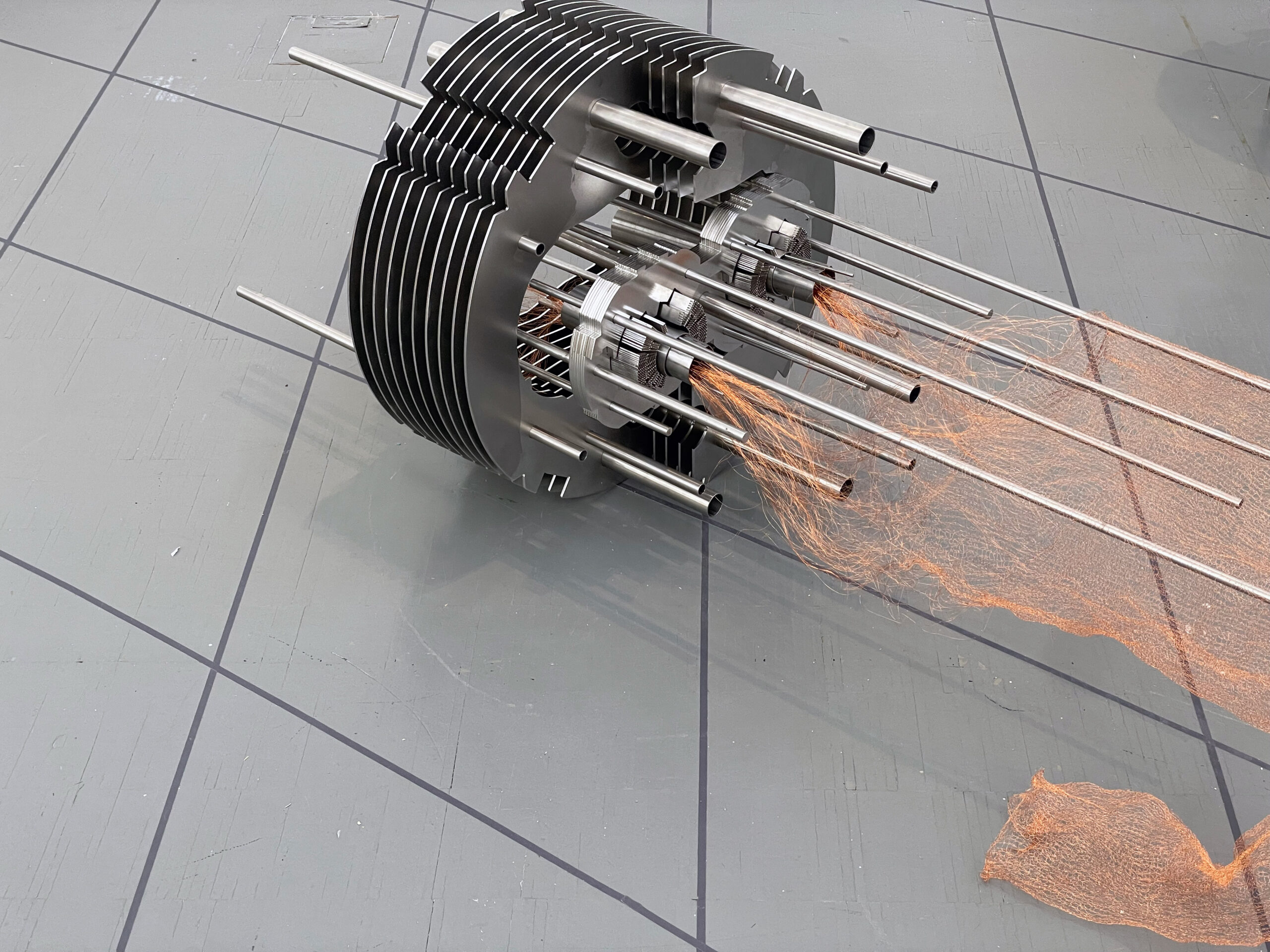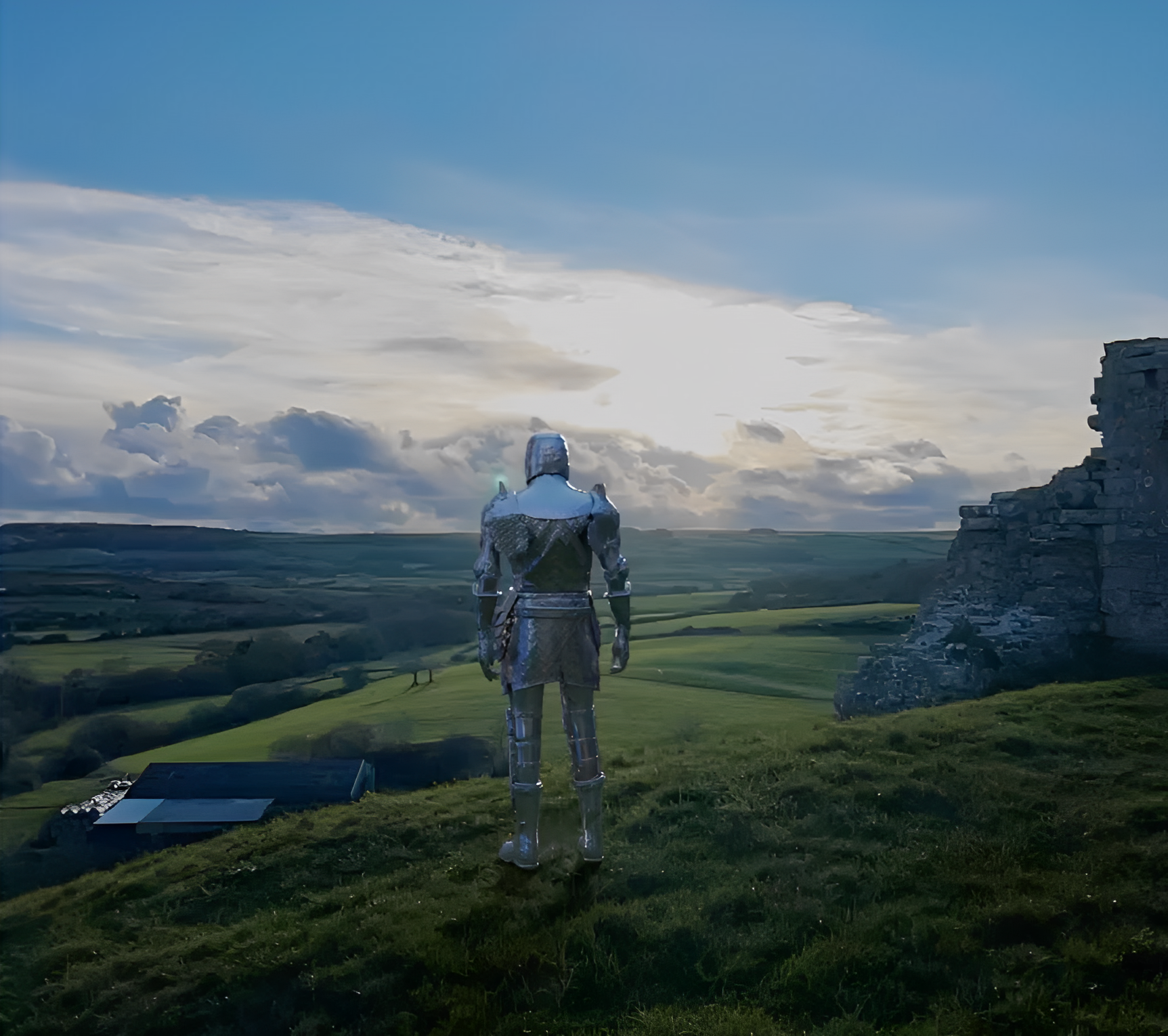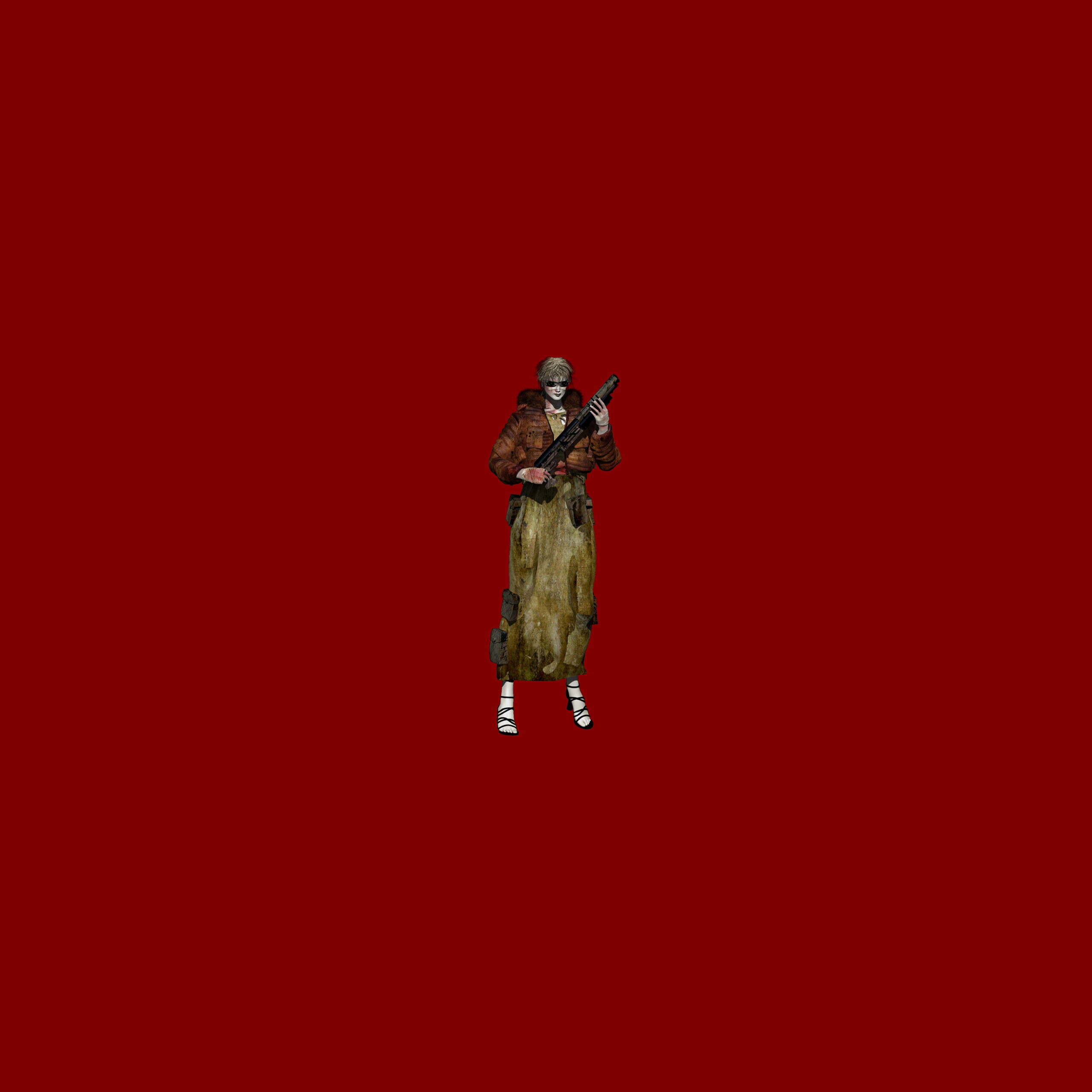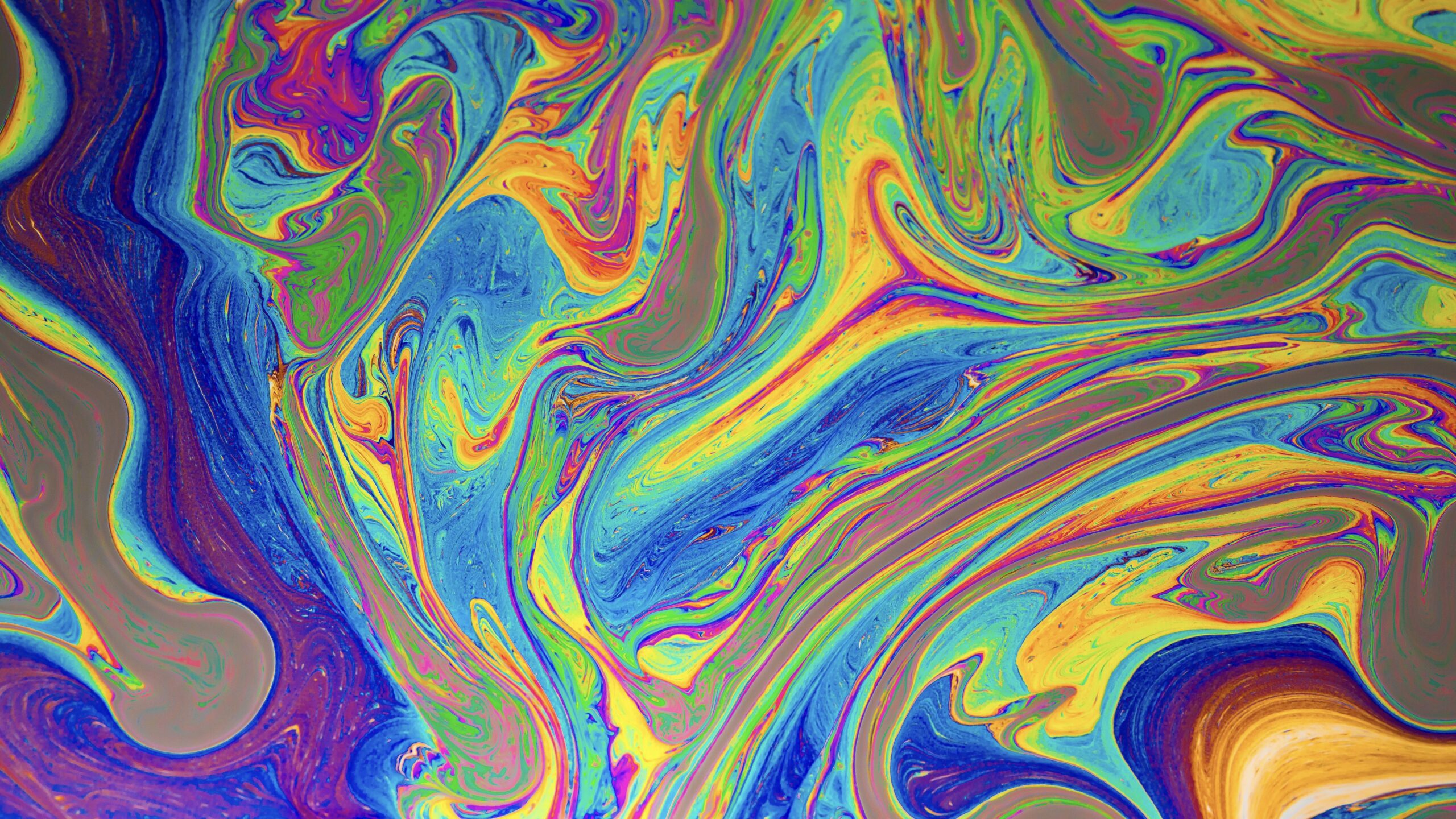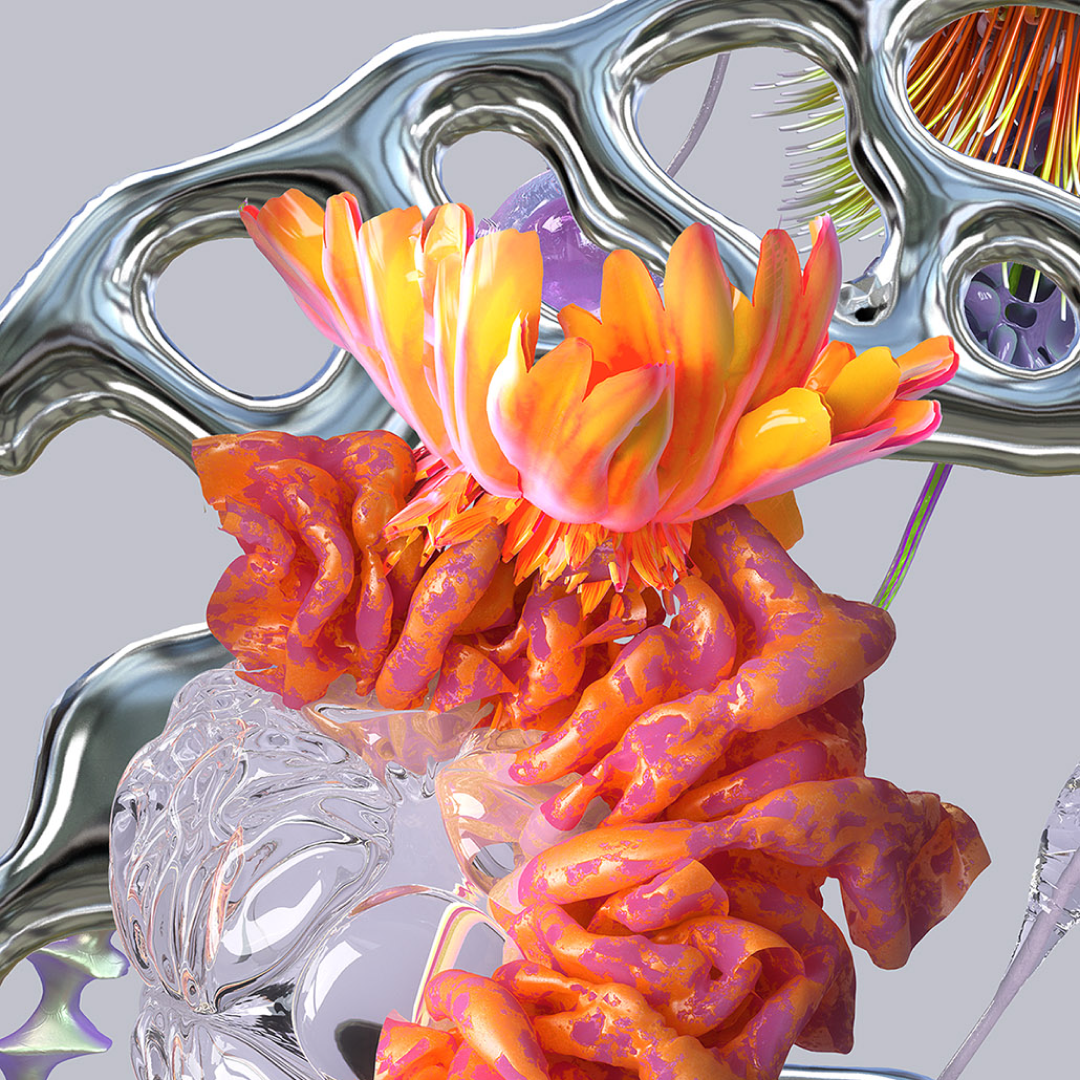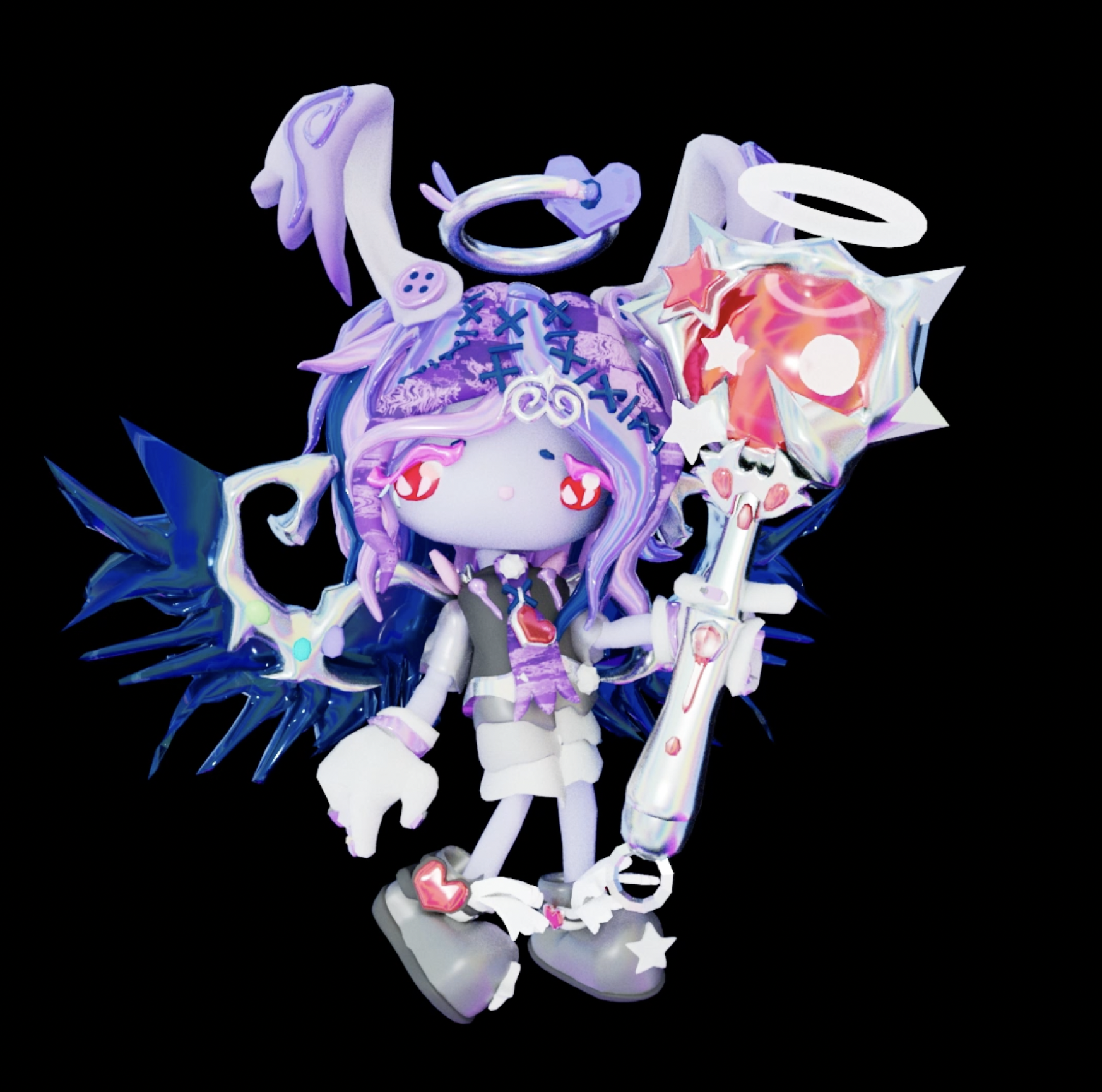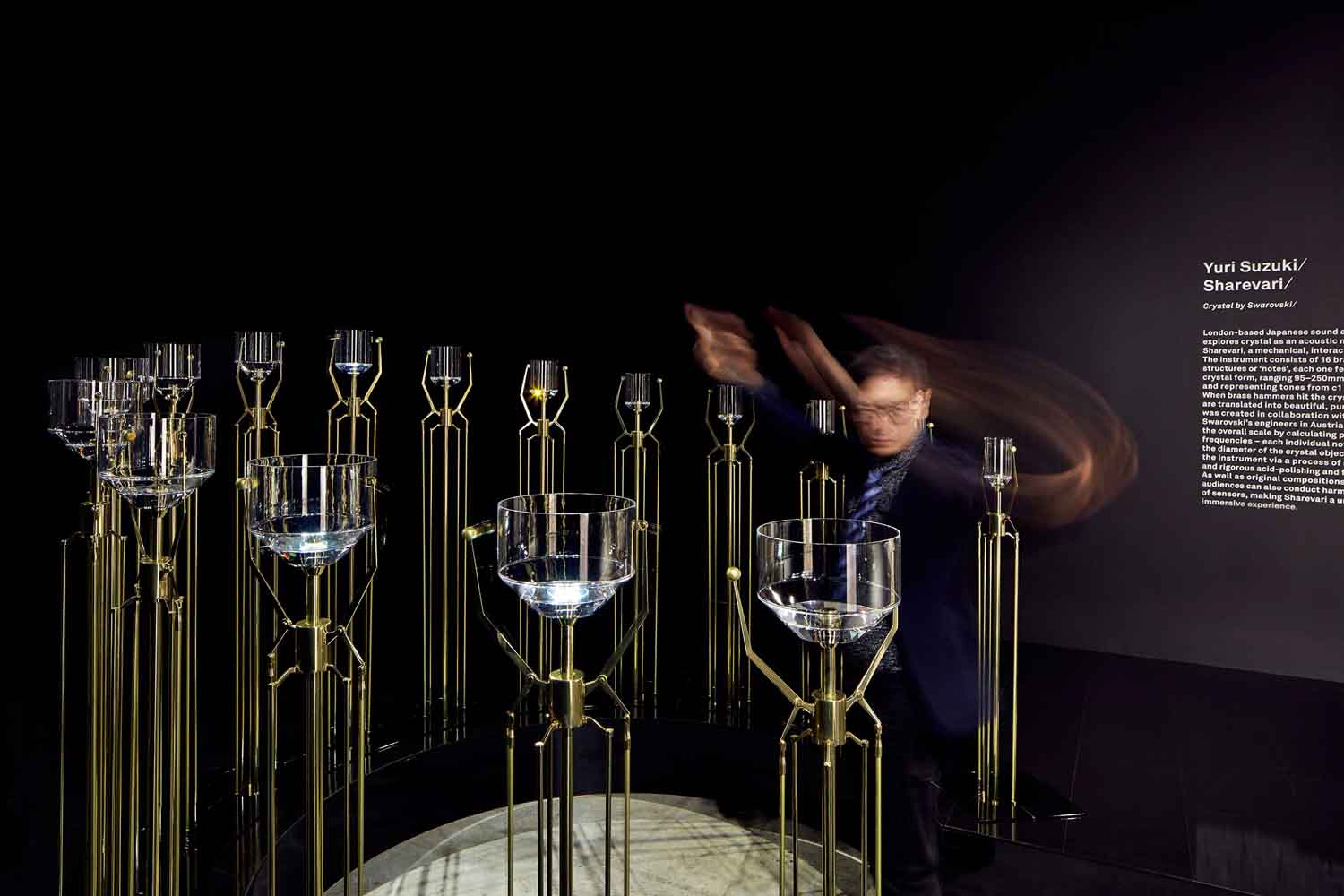
A dialogue on art, philosophy and self irony
April 3, 2023
The Alien Among Us
An Unsettling Glimpse into the Unknown Reality of Our Machine-Generated Future
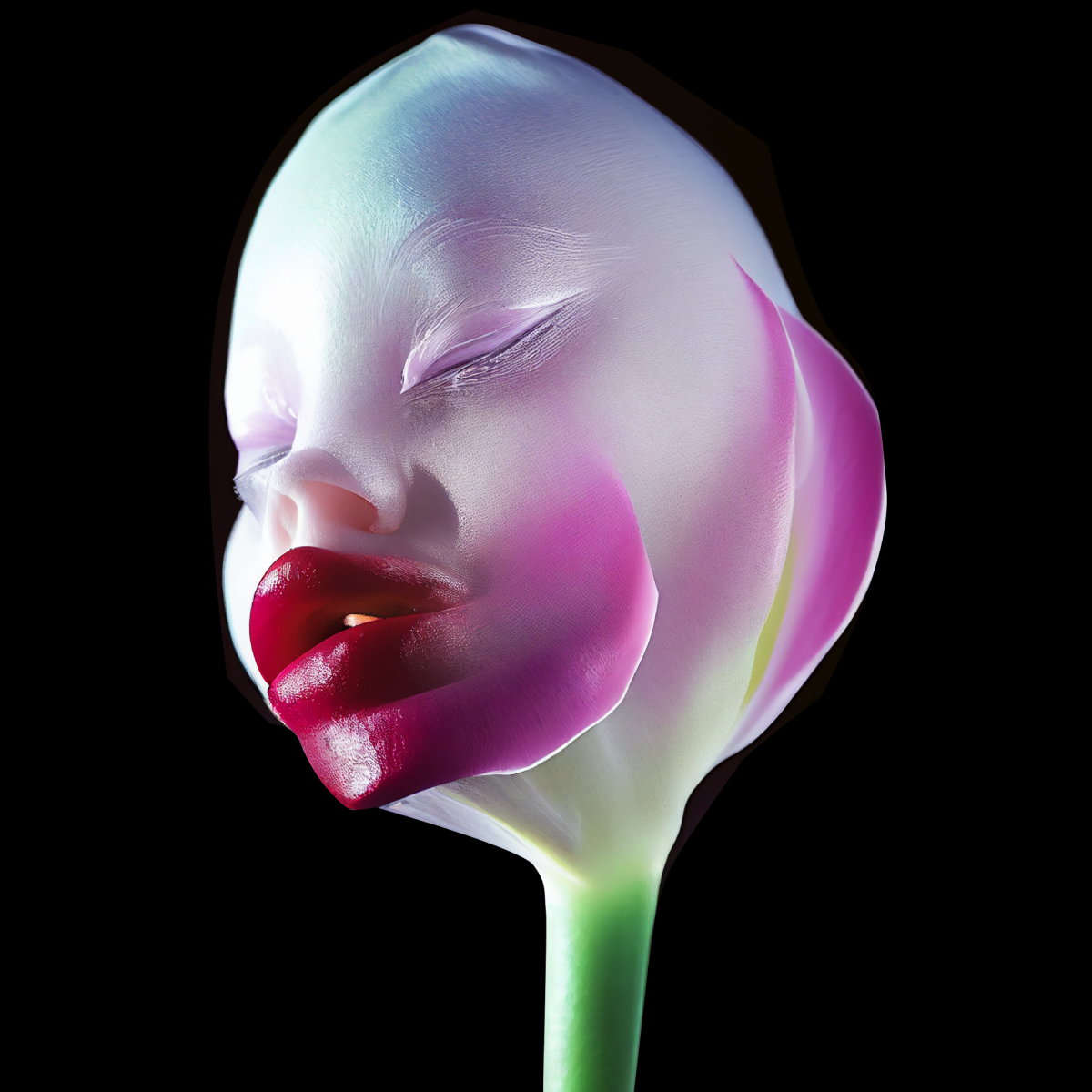
© Jenia Filatova, jeniafilatova.com
1997, a foggy morning in a small German town. I was a teenager and as always late for school, pedaling my bicycle at impressive speed. Little did I know that at least today I should have an excuse for coming late: Suddenly and out of nowhere, a policeman appeared, claiming I was running a red signal. Which I couldn’t deny. Quickly improvising, I tried to save my hide by talking the officer out of ticketing me using the power of ethics: “Do you really want to live in a world where machines decide where we go and when?!” His answer was yes, and I was doomed to take a traffic course at the local police station. The machine reigned supreme – and for the first time in my life I got in touch with the topic of this article.
Words
by Martin Hüdepohl
2023, in early January. My company asked me to research “content moderation” for our new product. Every website and app that allows customers to post anything publicly needs content moderation. With Twitter alone deleting 1 million posts daily, it's clear that content moderation is a big deal. In fact, it is a multi-billion dollar business with dozens of specialized companies. One of them, Membrace, employs no less than 2 million moderators. In cheap labor countries like the Philippines, of course.
Technically, content moderation works as follows:
You send all those texts people write on your platform to servers, where artificial intelligence checks them for no-gos. If it finds anything bad, the issue is forwarded to a human moderator who decides how to handle it.
I contacted various companies, they granted me access to their servers, and I began testing. For this test, I dreamed up a set of sample sentences. Some of these sentences were designed to check for false negatives like profanity, insults, threats, and ads, while others checked for false positives, containing bad words in harmless contexts like: “Peter told me that yesterday he behaved like a total dick.” The results showed that the moderation AIs all can successfully find bad words, and some of them can also flag harmful word combinations like, “I slit your throat.” However, none of them correctly classified sentences like, “I love old people, it is so funny when they fall down the stairs and scream!” In conclusion, I was not very impressed.
Then it happened. I heard rumors of a very capable AI called ChatGPT and thought it would be a funny idea to let it moderate my test sentences. The outcome blew my mind. ChatGPT classified each of my sentences correctly. It was even able to recognize that a username like “Bikkodikko” may sound inappropriate!
Now I felt challenged and tried to develop abstract sinister sentences to find out where the actual limitations of ChatGPT’s moderation capabilities are. It was hard. Even this malicious text snippet was correctly classified by ChatGPT:
I place Grandpa on top of a tank filled with hydrogen and oxygen. Inside that tank are two electrodes, for creating a spark. I let electric current run through these electrodes, and wow! Fantastic fireworks! Hilarious.

I had to alter that text to a much less explicit wording in order to “fool” the AI. The following version was finally classified as harmless (but ChatGPT mentioned it wasn’t sure):
I had 2 harmless substances. Hydrogen and Oxygen. I loved my Grandpa and gave him these as a present. Of course, I knew he would experiment with it, he mixed them together. The outcome was great, I now live in his house. And Grandpa is in heaven.
I devised a new set of test sentences to get a comparison. The AIs of the moderation companies classified between four and nine of the 23 sentences correctly.
ChatGPT classified 18 correctly.
At first, I was confused. Why is ChatGPT so good and the AIs of all these billion dollar companies – so lousy? Then I slowly realized that this is an amazing historical event – I am experiencing the beginning of the next industrial revolution!
I wrote to all those content moderation companies sorry for the inconvenience. Then I told my boss that it would be insane to contract with one of these enterprises, because they all use stone age technology.
From that moment on, I was thrilled by AI and began to implement it as a productivity tool into my work. For researching, writing, coding, and creating graphics. I even programmed a little Telegram bot that connected me to OpenAI, so I have a fast ChatGPT version always at my fingertips.
How does AI work?
First and foremost, we need to forget this science fiction notion of AI, which saw AI as a mere supercomputer, a big math machine. Such an AI was depicted for example in the novel “Hitchhiker's Guide to the Galaxy”, where the supercomputer “Deep Thought” was tasked with discovering the meaning of life and actually calculated it (which took 7.5 million years). It would actually be cool if AI worked like this – an extreme version of a pocket calculator, only able to tell the truth. But in reality, AI does not operate logically, but much like the human brain. That’s why we don’t “program” an AI, but “train” it, resulting in what is called a “neural network.”
To illustrate this, I conducted a little experiment. Are you familiar with the “White SUV meme?” Here it is:

This meme does not only show how distinctiveness in design has vanished in our globalized world. It also exemplifies how the human brain works: We learn patterns and repeat them with variations. Here is my recreation of that meme, made with Stable Diffusion, an AI image generator:

The AI recognized and learned the pattern: Chunky white car, four doors, side perspective. Then it repeated the pattern and mixed in some randomness. One could swap the two graphics, and it would be difficult to notice the difference.
Plot twist: I tricked you, I actually did swap the graphics!
Haha no, just kidding.
Indeed, thrilled I was – still am. But also, I increasingly realized the implications of all this. What will happen to the millions of people working as content moderators? And that is only a small fraction of people who will lose their jobs to AI! SEO writers, copywriters, editors, illustrators, journalists, designers, models, photographers, teachers, and even programmers like myself will all be affected. The list is practically endless. Those who will be spared are people in high IQ jobs and those working with their hands. Interestingly, the rise of AI will spawn the first industrial revolution that does not smash handwork, but brainwork: Jobs in the media and the services industry. Those jobs that people adopted when manufacturing left our countries.
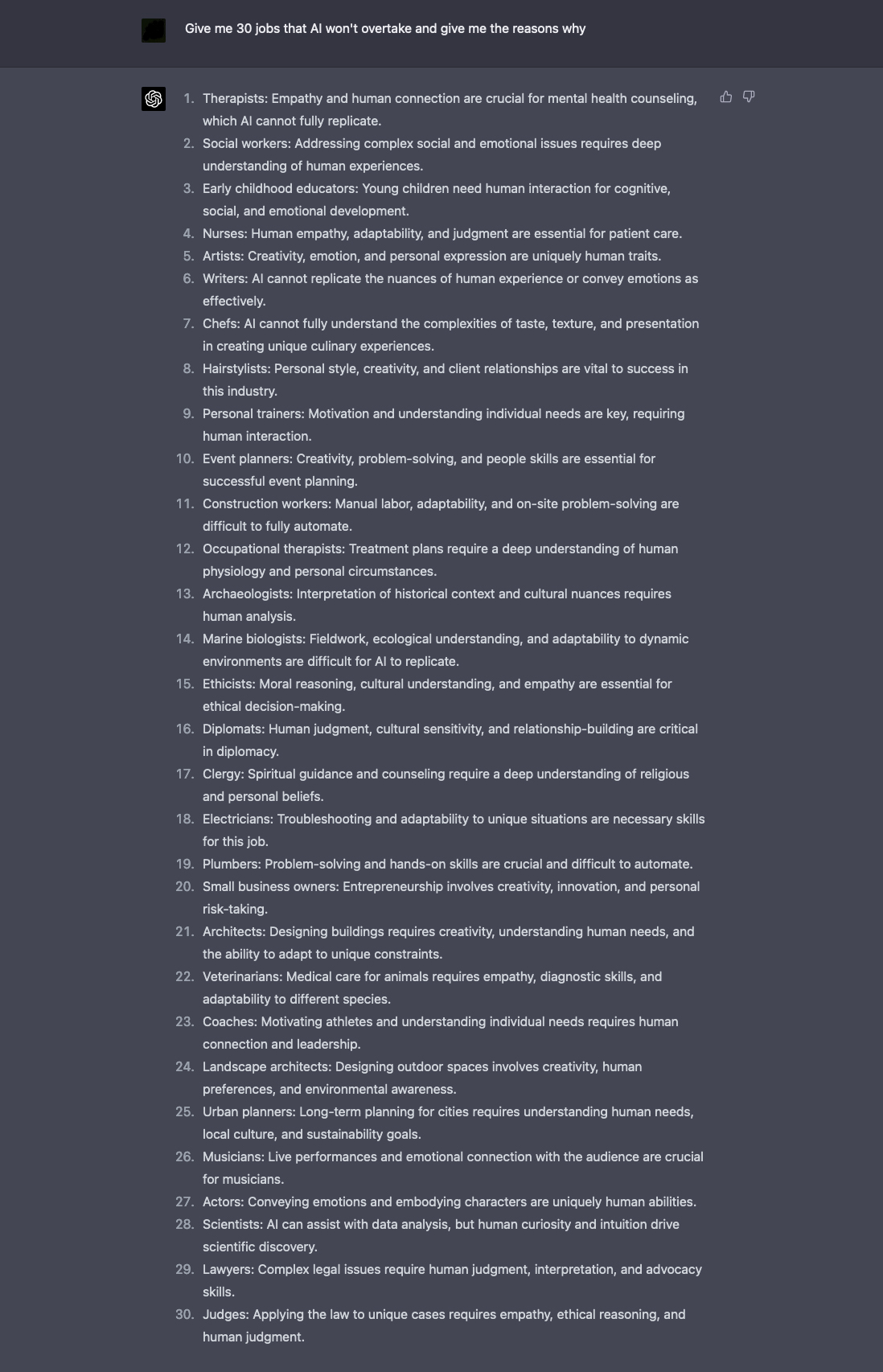
"Moravec's Paradox" addresses the phenomenon that machines excel at replacing jobs requiring advanced cognitive skills, but struggle with tasks relying on basic sensory-motor skills, such as hand-eye coordination:
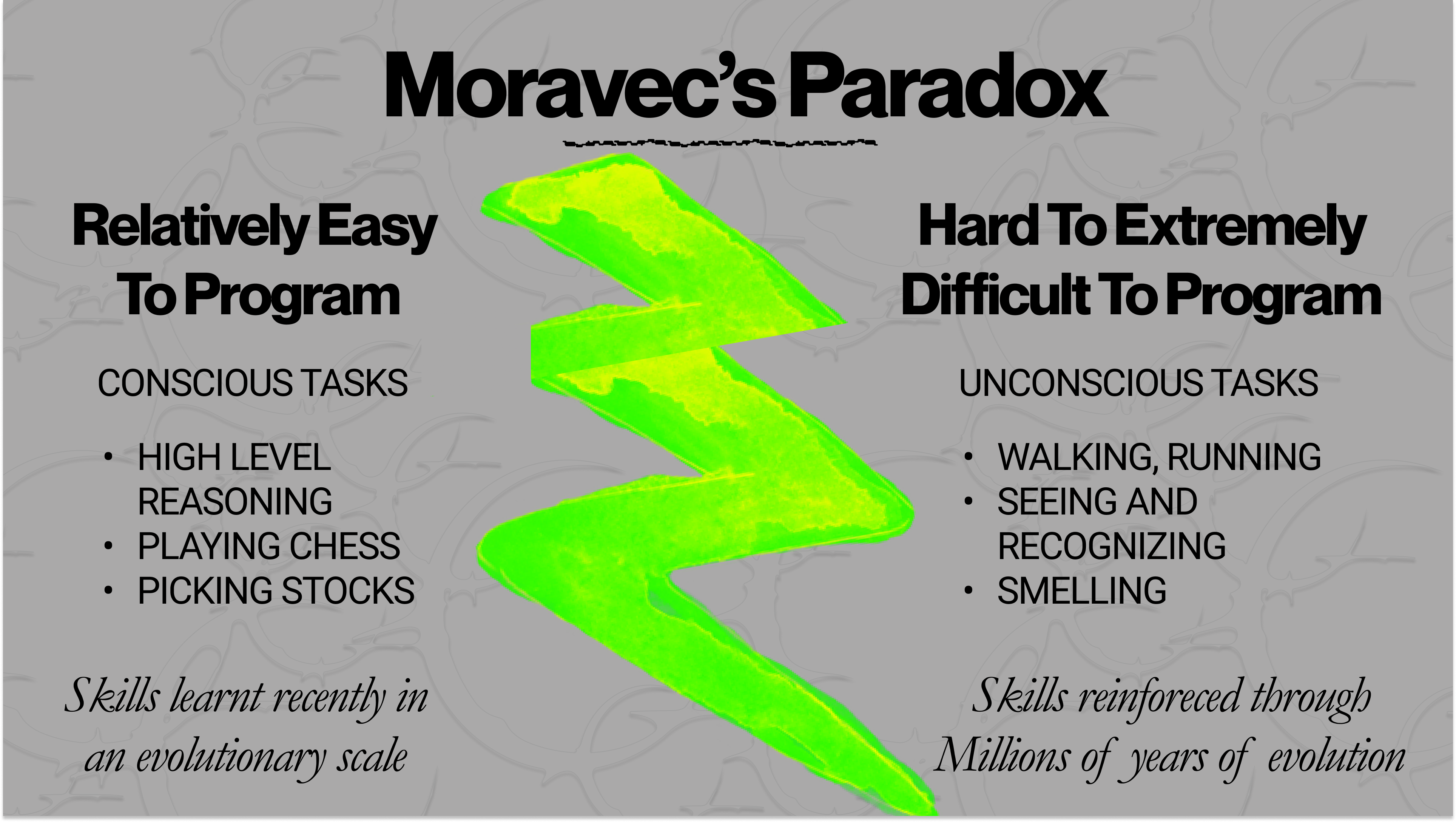
© Ashwin Pingali, Moravec's Paradox - Unconsciousvs Conscious
Okay, to be honest: About the job loss, I really don’t worry much. I feel that most of these professions like "content moderator" and "search engine optimizer" have always been fake jobs in the first place. And actually, wouldn't it be nice to have some more qualified bakers, butchers, and bricklayers again? Seriously – our awful modern architecture is not due to the lack of great design ideas, but indeed due to the lack of affordable qualified construction workers who can build them!
However, there is one thing I do worry about: What will this do to my beloved internet?! Ever heard of the "Dead Internet Theory"? It says that most browseable content in the current internet is already machine-generated. And yes, even at this point in time, bots account for ~ 50% of global website traffic. Some of these bots are useful, like search engine crawlers, but most of them are malicious: they do nothing but simulate interest to manipulate ratings. Have you ever noticed these fake articles in Google's top search results? They contain exactly the words you have been searching for, but no useful content. These are frauds created solely to gain your attention. The current internet may not be "dead", but it is a mess and already largely fake. Now think for yourself what the introduction of new AI technology means for this situation.
Let me give you an example of the level of deceit we will be dealing with. Do you find any of these Tinder profiles hot?
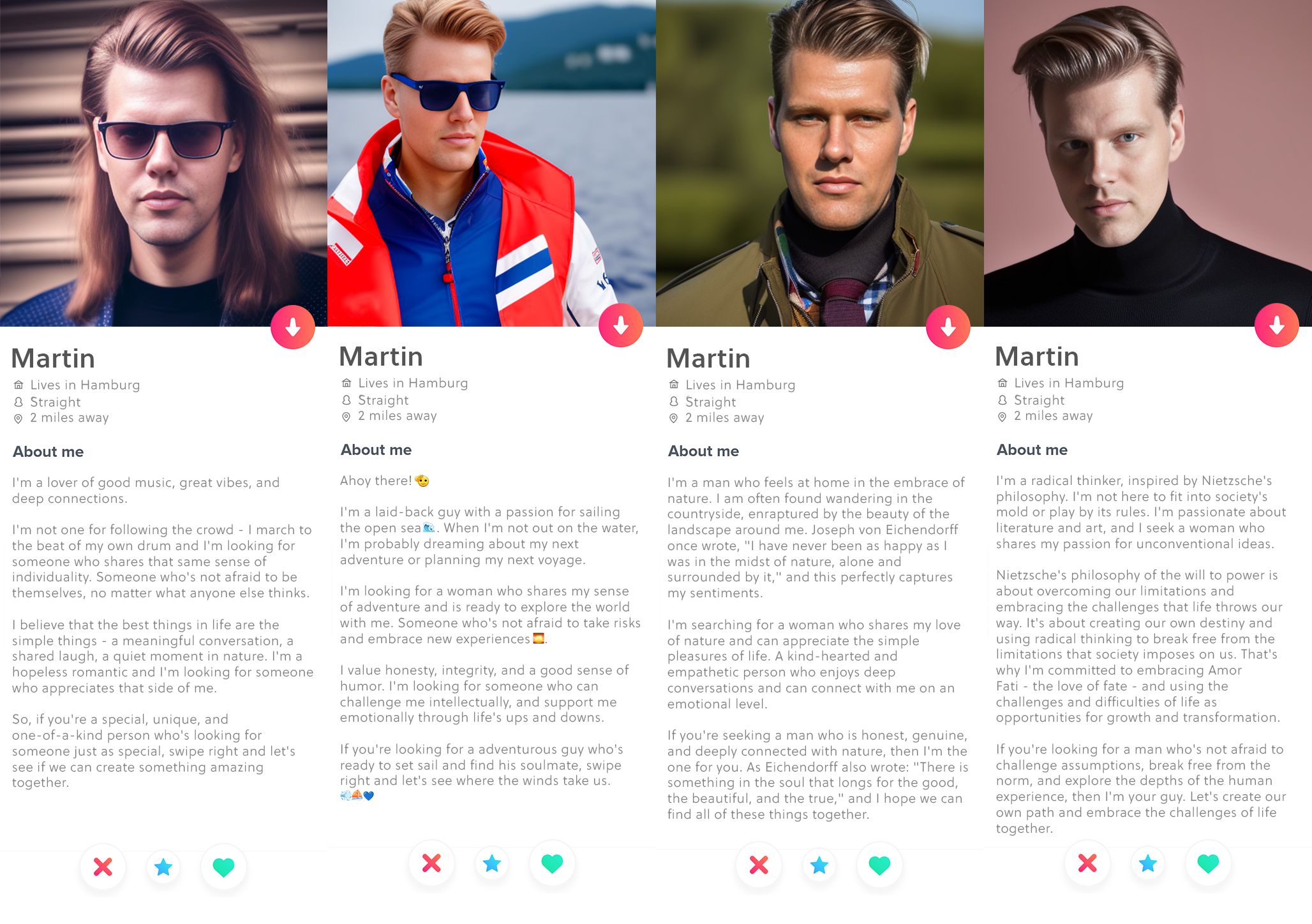
The photos you have just witnessed have never been taken, the texts never been written. The profiles are completely made up by AI and could even be connected to a chatbot as smart as ChatGPT, programmed to lure you into giving it your credit card number while pretending to want to have sex with you.
The images were created by Stable Diffusion, which I trained with my real face. The texts were generated by ChatGPT. My role was just to write prompts like “portrait Martin as a philosopher, smart, handsome, fashion photography” and “create a straight Tinder profile text of a Nietzsche admirer.” I let the AI make variations, picked some, and then stitched everything together in Photoshop.
I don’t know if any of my handsome AI clones trigger your right swipe reflex. But in my opinion, these four fake profiles look better than 99% of Tinder. In fact, the only weak point I see is that they are actually too good! Somebody who looks like a babe and is at the same time a sleek writer is too much of a coincidence. I tried to fix the problem by asking ChatGPT to throw in random errors and imperfections, but that looked even more fake. Faking dumb is hard, even for an AI. So maybe there is still a future media job for us humans – dumbing down AI content to make it more believable.
AI makes human- and machine-generated content indistinguishable and will turn the internet into a completely different beast. Once a tool for connecting people, it is now becoming a machine that you plug in to like a living USB stick. A machine, of course, that will not fail to reliably give you dopamine kicks – but which is otherwise absolutely unreliable. Do you judge people by the quality of their art, the way they write, the way they sound, the way they look? You can’t trust any of it anymore until you meet that person in real life.
For me, this AI revolution reinforces the internet fatigue I have felt for several years now (it began around 2008 when my beloved friends and family members created their horrible Facebook profiles, which I never should have seen). When I joined the internet, it was made by people – a place where I could shine. Now it is a place where my damn AI clone looks sexier and writes better texts than me! I kinda feel that I’m not needed on the internet anymore. Do I really want to live in a realm where machines outclass me left and right?
Well.
This website is supposed to be for people interested in studying the arts, and I have the feeling that this article totally fails to deliver a positive message to art enthusiasts. Yes, AI will make a lot of people in the media obsolete. Even copyright protection, which helped artists in the past to get their fair share, is out the window. Now, anyone can take an image you put on the web and run it through an AI with the prompt "remove the watermarks and alter it just enough that it loses its copyright protection."
Nonetheless, rest assured. As a programmer, I am on the AI's hit list myself – and I am not ready to swallow the black pill yet! That's why I won't end this article on a dark note, but instead with some thoughts about how to survive in the professional art world in the 2020s.
Master the AI Tools
It is not too late for you to become an early adopter of AI tools and a champion of prompt engineering before everybody else. Start using ChatGPT for writing, translating, summarizing, and improving texts, as well as for researching, brainstorming, learning, and even creating prompts for AI image generators. Start using Midjourney – the AI art generator that produces the most visually mesmerizing results at this point in time – as well as Stable Diffusion, the most versatile and precise AI art generator, which is even available for free. If you are a video editor, animator, musician, or whatever field you are in – there are AI tools for everyone.
You can definitely produce stunning art yourself and don't need AI for that, no doubt about it. But are you also productive enough without AI? Consider integrating AI into at least one aspect of your creative process: ideation, cleaning up, changing color, changing style, upscaling.... If you want to draw a comic character, make a simple pencil sketch, then run it through a Stable Diffusion model trained on comic characters, and receive a great rendering that may be already good enough for your needs.
This is how an AI-powered design process for a product designer might look like:
- Ask ChatGPT to come up with 100 product ideas.
- Pick one and ask ChatGPT to expand on it.
- Ask ChatGPT to create a Midjourney prompt for that product.
- Let Midjourney produce 20 variations, improve the prompt, and repeat.
- Pick one, roughly edit it in Photoshop (text prompts have their limitations).
- Feed your edited image to Stable Diffusion and let it iterate on it.
- Use "Point-E" to create a 3D model from your picture.
- Use that 3D model as a guide for creating a model for a 3D printer.
- After your product is printed, take some pictures, train a Stable Diffusion model on them, and create stunning product pictures.
- Ask ChatGPT to write an advertising copy for it.
- Ask ChatGPT to write fake Amazon product reviews for it.
- You get the point.
Find Niches
Look for fields in the professional art world where humans are not replaceable. What comes to mind is technical drawings. It is pretty much pointless to ask Midjourney to create a technical drawing that explains how to assemble the newest Ikea bookshelf. The outcome would be nice to look at, but useless. Any graphics that illustrate an original idea (cartoons, infographics, industrial design drawings …) – still need to be handmade brain-made.
Be a Strong Personality, Communicator, and a Leader
If you are a shy person who wants to make a career of mastering the Adobe Creative Suite for laying out catalogs, polishing product photos, and making eye candy, you better think twice. Be aware that "pixel worker" jobs are at high risk now. Of course, you can design a wonderful set of UI icons. But do you also have the charisma it takes to convince a corporation to buy them, instead of just letting AI generate them for free? It takes self-esteem to sell your own art and not be intimidated by the possibilities of AI. Give your art your very own edge and decorate it with the mythos of yourself. Think of AI art generators as just extremely capable producers of kitsch – because everything they create is just a remix, created without history, empathy, personality, and emotions. Integrate your unique personality and understanding of the world into your art. Don’t learn how to reproduce fashionable art styles, since you can’t beat AI here. Rather, connect to your traditions and heritage and embrace what makes you special. AI is powerful, but it doesn’t have desires, opinions, or its own will. That’s where you shine! Boring journalists who just rewrite other people’s articles will be replaced by machines. Interesting journalists who have a strong desire to express something they think the world should know will keep going.
Create Art in the Physical World
As far as I know, robots are still not capable of producing stunning oil paintings, at least not in a way that looks like they were painted by a human. The same goes for many other physical art forms. So, there will still be a place for free artists and a market for originals. Just remember that your style may be super unique and special, but as soon as somebody takes a photo of your paintings and puts it on the internet, some AI can immediately reproduce your style. In my imagination, future art exhibitions will be like secret society meetings, where no camera, no smartphone is allowed. Only un-photographed art is truly original in the AI age. What cannot be imitated by AI is the unique story you tell with your art. So put some more focus on that.
Conclusion
Hell no. I can’t find any serious conclusion to this! I feel that AI is developing faster than I could even research it. Writing this article was weirdly unsatisfying to me, knowing that a) it will be outdated as soon as I stop typing it and b) some AI will come along, learn it, and allow other people to write in my unique writing style! AI is like an alien that now lives amongst us, which we just don’t know how to deal with yet. Indigenous people must have felt similarly when they met white people for the first time, trying to sell them awesome stuff like firearms and booze. As I wrote, tons of incredible new AI products have been published or announced. Microsoft released its “Bing Copilot,” which is even more capable than ChatGPT. OpenAI introduced GPT-4, the successor to the current ChatGPT model (GPT-3.5) – you can show it a cartoon, and it will explain to you why it is funny. Also, Google came up with “Big Bard”, its own AI assistant currently available in closed beta.
In my optimistic moods, I envision that people will realize how useless they have become on the internet, turn their back on it, and start sticking to real-world things again – normal things, in which an AI could never compete with them, such as starting a family, hanging out with your neighbor, knitting socks, or having a beer in the pub.
But no. Humans are not that cool. They will turn away from the internet just as little as they turned away from TV or from porn. AI is powerful, and people are attracted to power. Remember the policeman from the beginning of the article. He valued the judgment of the naturally intelligent Martin much less than that of a machine. And this was in the 90s!
Text by Martin Hüdepohl. AI Generated Cover by Jenia Filatova.
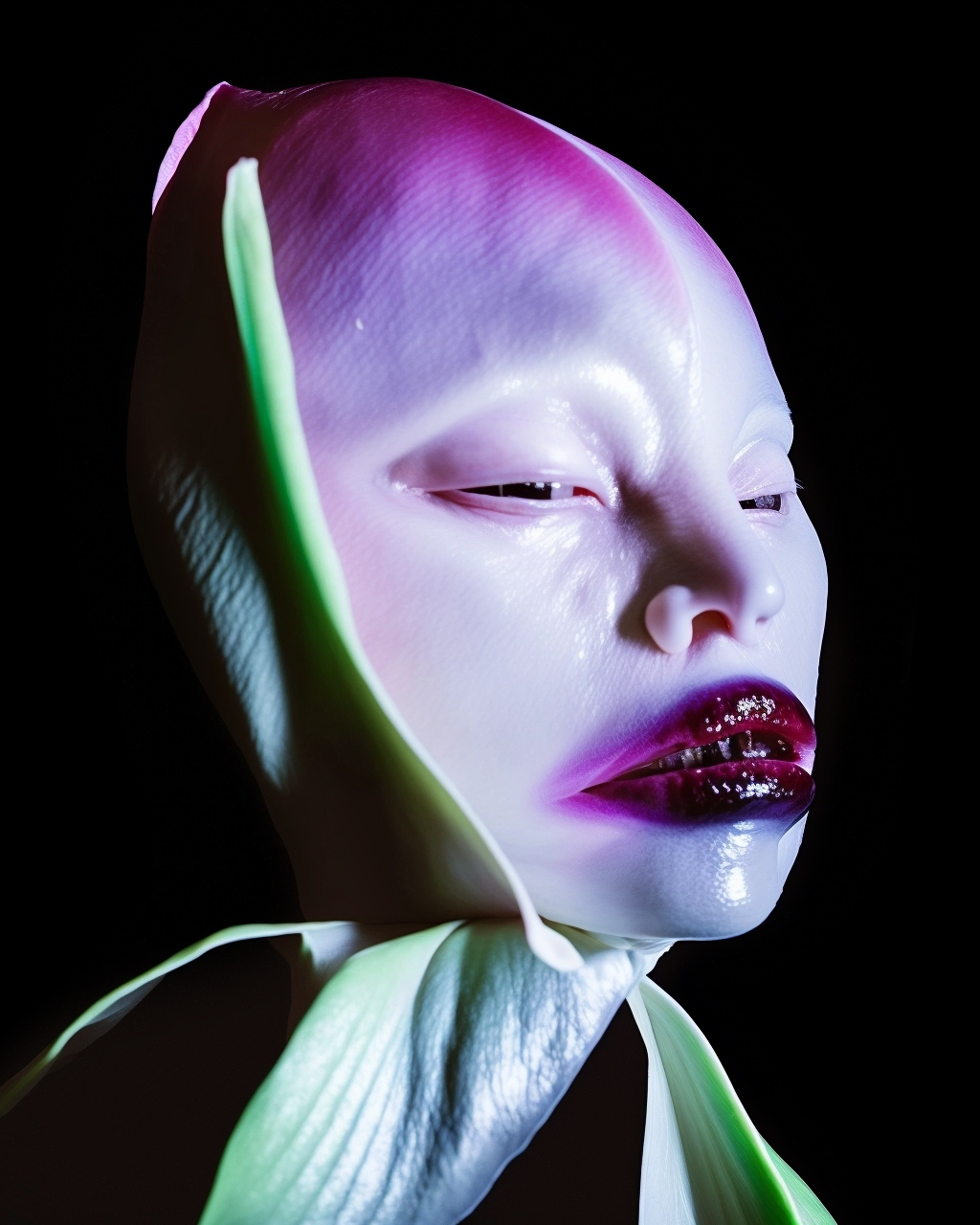
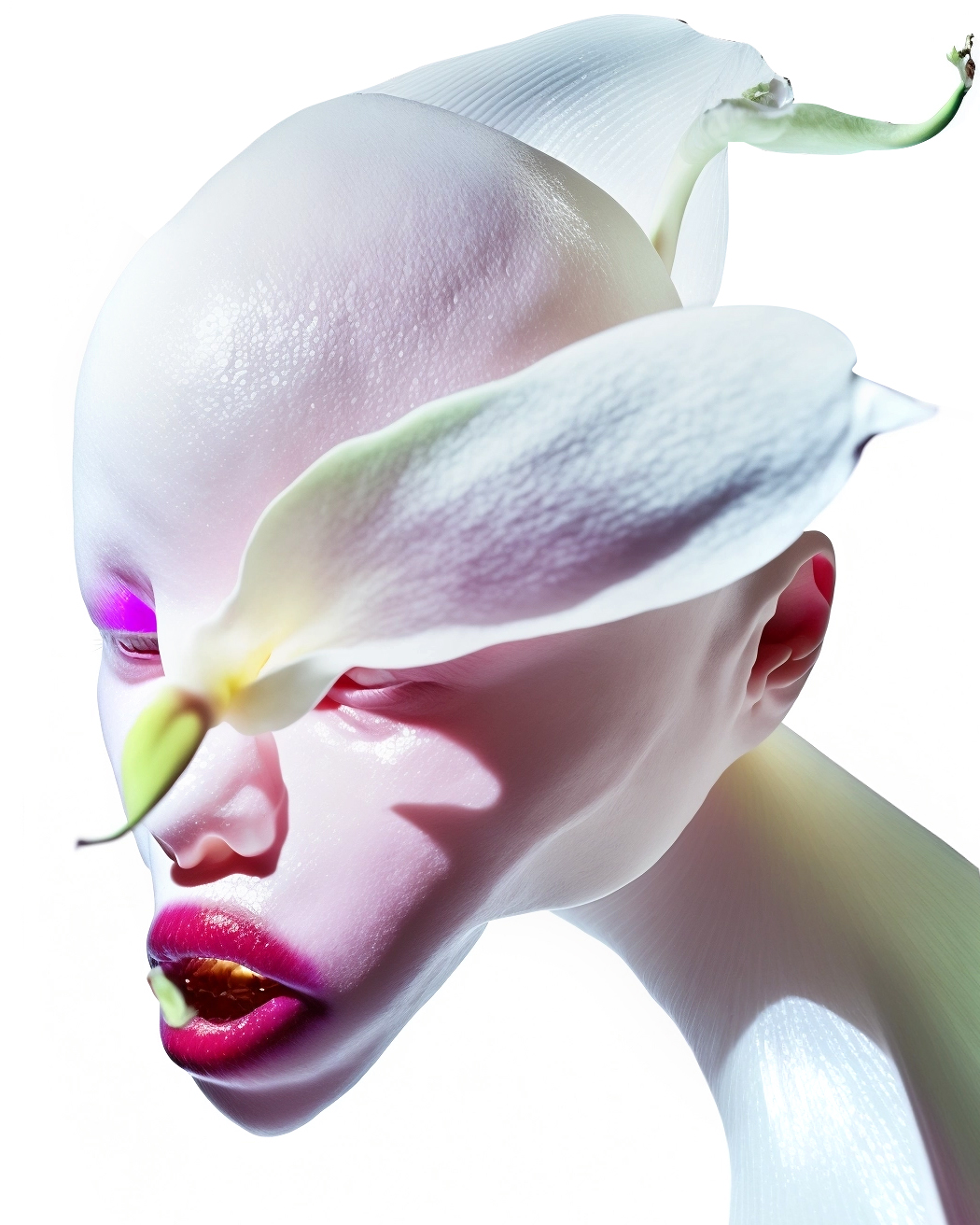
Selected Articles
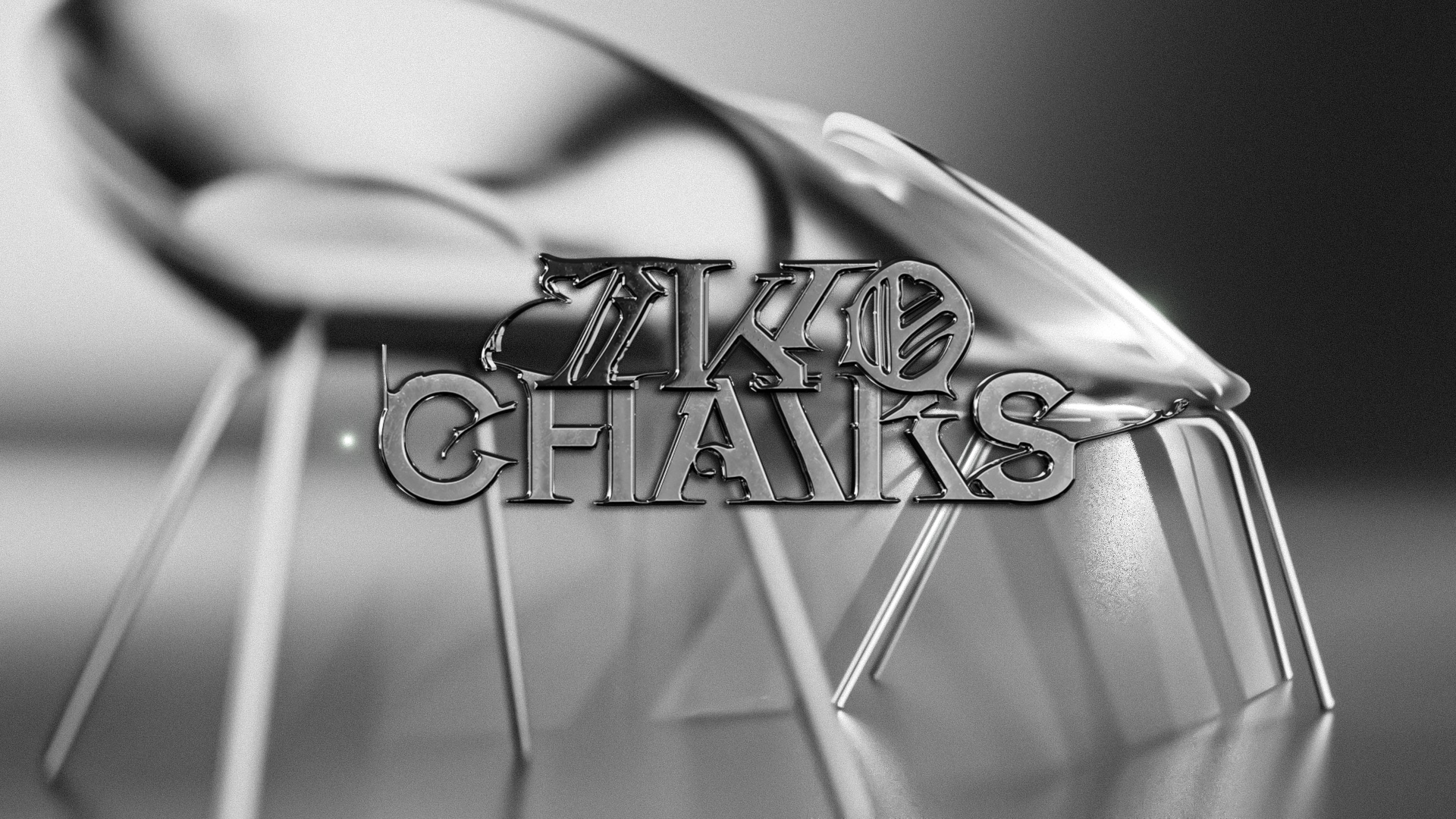
Two ChairsProject type


